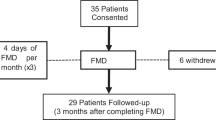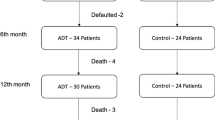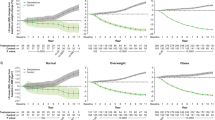Abstract
The aim of this study was to examine the influence of hormonal therapy (HT) on glucose metabolism in prostate cancer (PCa) patients. Fifty-two PCa patients receiving HT with gonadotropin-releasing hormone (GnRH) analogues and/or antiandrogen drugs were enrolled in this study. Both blood and urine samples were taken a few hours after breakfast before and after HT, and glucose levels in the blood and urine were measured. Elevations of blood glucose levels of 30–50, 50–100 and over 100 mg/dl after HT as compared with the levels before HT were observed in two, eight and five patients, respectively. Urine examination revealed deterioration of glucosuria in seven patients. The mean blood glucose level after HT was significantly higher than that measured before HT. The elevation of blood glucose level significantly correlated with concurrence of diabetes mellitus (DM) and higher body mass index (BMI) before HT. Deterioration of glucosuria significantly correlated with the concurrence of DM. HT for PCa patients, especially with concurrent DM or obesity, induces elevation of the blood glucose level and deterioration of glucosuria. Therefore, glucose intolerance should be considered during HT for PCa.
This is a preview of subscription content, access via your institution
Access options
Subscribe to this journal
Receive 4 print issues and online access
$259.00 per year
only $64.75 per issue
Buy this article
- Purchase on Springer Link
- Instant access to full article PDF
Prices may be subject to local taxes which are calculated during checkout

Similar content being viewed by others
References
Okihara K, Nakanishi H, Nakamura T, Mizutani Y, Kawauchi A, Miki T . Clinical characteristics of prostate cancer in Japanese men in the eras before and after serum prostate-specific antigen testing. Int J Urol 2005; 12: 662–667.
Cancer registration committee of the Japanese Urological Association. Clinicopathological statistics on registered prostate cancer patients in Japan: 2000 report from the Japanese Urological Association. Int J Urol 2005; 12: 46–61.
Suzuki K, Kobayashi M, Tokue A . Clinical evaluation of hot flushes developing during endocrine therapy for prostate carcinoma. Nippon Hinyokika Gakkai Zasshi 2003; 94: 614–620.
Smith JC, Bennett S, Evans LM, Kynaston HG, Parmar M, Mason MD et al. The effects of induced hypogonadism on arterial stiffness, body composition, and metabolic parameters in male with prostate cancer. J Clin Endocrinol Metab 2001; 86: 4261–4267.
Basaria S, Lieb II J, Tang AM, DcWeese T, Carducci M, Eisenberger M et al. Long-term effects of androgen deprivation therapy in prostate cancer patients. Clin Endocrinol 2002; 56: 779–786.
Smith MR . Changes in fat and lean body mass during androgen-deprivation therapy for prostate cancer. Urology 2004; 63: 742–745.
Smith MR, Finkelstein JS, McGovern FJ, Zictman AL, Fallon MA, Schoenfeld DA et al. Changes in body composition during androgen deprivation therapy for prostate cancer. J Clin Endocrinol Metab 2002; 87: 599–603.
Inaba M, Otani Y, Nishimura K, Takaha N, Okuyama A, Koga M et al. Marked hyperglycemia after androgen-deprivation therapy for prostate cancer and usefulness of pioglitazone for its treatment. Metabolism 2005; 54: 55–59.
Basaria S, Muller DC, Carducci MA, Egan J, Dobs AS . Hyperglycemia and insulin resistance in men with prostate carcinoma who receive androgen-deprivation therapy. Cancer 2006; 106: 581–588.
Schattner A, Katz-Porat BS, Gindin Y, Geltner D . Cyproterone-induced hyperosmolar hyperglycemia. Drug Intell Clin Pharm 1988; 22: 632–633.
Coddington CC, Hassiakos DK, Harrison HC, Brzyski RG, Jones GS . Effect of a gonadotropin-releasing hormone analogue on the glucose metabolism in a diabetic patient. Gynecol Obstet Invest 1990; 30: 246–248.
Morimoto S, Fernandez-Mejia C, Romero-Navarro G, Morales-Peza N, Diaz-Sanchez V . Testosterone effect on insulin content, messenger ribonucleic acid levels, promoter activity, and secretion n the rat. Endocrinology 2001; 142: 1442–1447.
Author information
Authors and Affiliations
Corresponding author
Rights and permissions
About this article
Cite this article
Suzuki, K., Nukui, A., Hara, Y. et al. Glucose intolerance during hormonal therapy for prostate cancer. Prostate Cancer Prostatic Dis 10, 384–387 (2007). https://doi.org/10.1038/sj.pcan.4500976
Received:
Accepted:
Published:
Issue Date:
DOI: https://doi.org/10.1038/sj.pcan.4500976
Keywords
This article is cited by
-
Cardiovascular and metabolic complications during androgen deprivation: exercise as a potential countermeasure
Prostate Cancer and Prostatic Diseases (2009)



